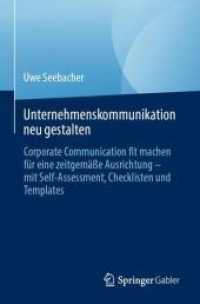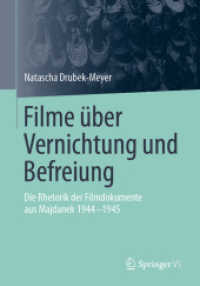- ホーム
- > 洋書
- > 英文書
- > Religion / Ethics
Full Description
This book examines two English translations of Mishkāt ul-Maṣābīḥ by Al-Tabrīzī and reflects on some of the key issues relating to Hadith translation. The highly instructional nature of the Prophetic Hadith means that the comprehensibility of any translation is of great importance to a non-Arabic-speaking Muslim, and there is a need to analyze available translations to determine whether these texts can function properly in the target culture. The volume considers the relevance of skopos theory, the concept of loyalty, and the strategies of the translators in question. There are also chapters that focus on the translation of Islamic legal terms and metaphors related to women, formulaic expressions, and reported nonverbal behavior in Fazlul Karim's (1938) and Robson's (1960) versions of the text.
Contents
Introduction
1 Understanding The Hadith: Issues Related to The Hadith and its Translation
2 The Relevance of Skopos Theory to the Translation of The Hadith
3 Translation Mishkāt ul-Maṣābīḥ into English: Theoretical and Methodological Issues
4 The Translation of 'Islamic-Legal Terms' and 'Metaphors' Related to Women in Karim's and Robson's Versions of Mishkāt ul-Maṣābīḥ
5 The Translation of Formulaic Expressions in Karim's and Robson's Versions of Mishkāt ul-Maṣābīḥ
6 The Translation of Reported Non-Verbal Behaviour in Karim's and Robson's Versions of Mishkāt ul-Maṣābīḥ
Conclusion








